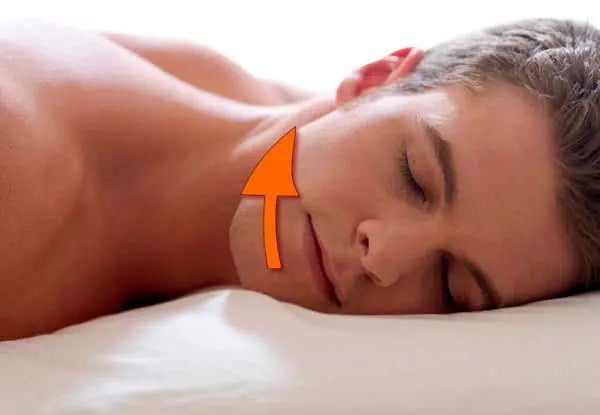Correct sleeping position

Few people are aware that the habit of sleeping in the wrong position can cause pain, jaw dysfunction, facial morphological changes and altered posture, which can frustrate many therapies.
All those who sleep on their stomach (prone position) or on their side with their mouths open, cause constant pressure on one side of the face. This position forces the jaw to deviate from its neutral position, constantly traumatising the teeth and the entire masticatory system.
Over time, the pressure can even change the shape of your face and the alignment of your teeth.
If, on the other hand, you sleep on your side, holding your arm over your face as if to hide your head in your armpit, the prolonged pressure on your jaw and jawbone can distort the entire dental arch on the affected side inwards, even shifting the teeth.
You can immediately recognise people sleeping in the position described above by looking closely at their face and teeth. One can see the adaptation of the dental arch to the pressure at the point where the arm usually rests on the cheek, invariably obtaining from them confirmation of the position in which they usually sleep. These people are very surprised that someone can recognise their sleeping position just by looking at them, since rarely does anyone associate the deformation of a face with the sleeping position.
There are people who wonder why they wake up in the morning more tired than they are going to sleep, even though they are resting on a comfortable bed, while others seem to sleep well even on rocks. The first to get blamed are the mattress and the pillow. We meet people who have tried many pillows and even several mattresses, without being able to improve the situation.
No one doubts that good sleeping support is essential for a good night's sleep, but the combination of an inadequate sleeping position and a cervical spine with misaligned first vertebrae is detrimental. After spending up to thousands of Euros to buy the best bed available, many find that the situation and their pain have not resolved. It is not uncommon for people undergoing Atlantomed to say that if they had discovered the method earlier, they would have saved a lot of money and pain.
It is certainly not easy to change a deeply rooted habit from childhood and get used to sleeping in a new position, but it is a necessary step.
Another phenomenon to be aware of: the walls of the veins are not as rigid as those of the corresponding arteries, but tend to collapse in on themselves. It is gravity and the weight of the falling blood that keep them open. When you are lying down, this help is lacking and all the pressure needed to circulate the blood must be generated by the heart.
For this reason, lying down can exacerbate certain physical problems affecting the veins and circulation. If we add to this the compression of the vessels, caused by a misaligned Atlas or epistrophe, and a further constriction due to twisting the neck to keep the head turned to the side for many consecutive hours, you can imagine the result for yourself.
A blockage of the first cervical vertebrae restricts the rotation of the head to one side and forces one to sleep with the head always turned to the opposite side. This situation limits by 50% the freedom to alternate between the two sides during sleep. Prolonged pressure on the masticatory apparatus, hinders blood circulation, traumatises the teeth, gums, jaw joints, nerves and muscles involved.
As the situation is repeated every night for many hours, over time permanent damage is done to the masticatory system, the teeth deteriorate and the jawbone deviates (dental malocclusion), with negative repercussions on the rest of the body.
It may reassure you to know that sleeping on your stomach does not change the alignment of the Atlas.
The most frequent symptoms of sleeping in an incorrect position
We would like to point out that the causes of the disorders listed may also be other than the wrong sleeping position.
- difficulty in keeping the mouth open for long periods
- cracked, gapped, abraded, mobile, hypersensitive teeth with exposed collars,
- gum recession and inflammation, periodontal pockets and pyorrhoea,
- noises and clicks of the mandibular joint, difficulty and pain in opening and closing the mouth,
- pain and tension in the facial muscles, especially in the morning when waking up,
- pain and difficulty in swallowing, moving the tongue and even speaking,
- trigeminal neuralgia, headache, uncomfortable tension and eye pain,
- accidental and painful biting of the tongue, inside of the cheek or lips,
- pain in the temples, ears, neck, back, loins, legs, postural abnormalities,
- feeling of instability, dizziness, tinnitus, ringing or whistling in the ears, anxiety and neurosis.
After years of being spoiled, it can be difficult to get used to sleeping in a new, unfamiliar position, but the results you can achieve will definitely pay off in terms of your recovered health and avoided dental costs!
If you learn to sleep correctly on your back, many chewing and skeletal problems will resolve themselves over time.
Videointerviste insonnia
racconti dopo il riallineamento dell'Atlante
Alcune testimonianze dal forum
- Martaven: Dormire meglio: nuova Vita!
- Dyedory: Volere il meglio dà risultati!…anche nel dormire bene!
- Paolo da: Mi sento meno gobbo e riposo meglio!
- Italo: Mal di testa addio, ora dormo e riposo meglio.
- Scorta Fulvia: Cefalee, qualità del sonno e della mia vita migliorata sensibilmente
- Isa69: Trovata la soluzione per dormire bene: sono rinata!
- Altre testimonianze: insonnia e dolori
What people say about us
The only ones with over 9000 testimonials and reviews in several languages! Click to access the related platforms and read many opinions, feedbacks, experiences and testimonials after the Atlantomed vibro-resonance Atlas correction. Be wary of imitations.
Written by: Alfredo Lerro



